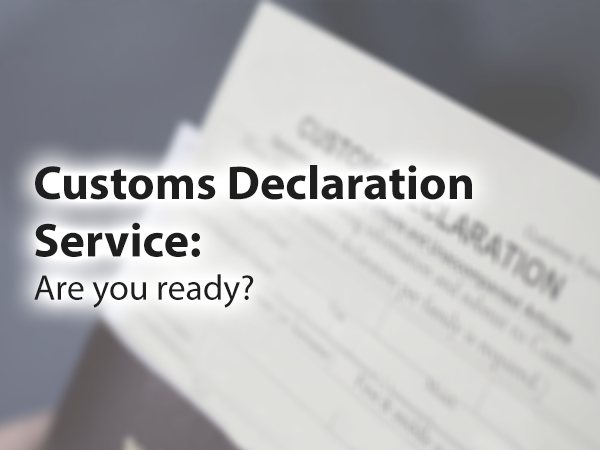The UK exports and imports more than £983bn worth of goods every year*. Declarations for the millions of shipments involved in this trade are set to be transformed soon with the introduction of the Customs Declaration Service (CDS). When it comes into force – during early 2019 – it’s likely to bring with it a drastically increased administrative burden on the distributors that it affects.
What is the Customs Declaration Service?
The Customs Declaration Service (CDS) is a new way of declaring imports and exports that happen outside the EU. It will replace the current Customs Handling of Import and Export Freight (CHIEF) and a phased introduction has been underway since August this year. However, all declarations will be required to be made under CDS from February 2019.
Although the intention to introduce CDS was made before the Brexit referendum, it’s clear that CDS will need to be scaled to accommodate goods movements to and from EU countries once the UK has left the EU.
How does CDS differ from CHIEF?
CHIEF allows traders to process declarations, pay taxes and duties and to submit electronic customs information. Using CDS, traders will still be able to do all this, but there are some difference too:
- CDS access will be via the .gov.uk website, using a Government Gateway account
- CDS will allow traders to view data and reports on previous imports and exports, check tariffs, apply for various authorisations and to check duty statements
- The Government gateway will include online help, guides, checklists and self-service tools
More importantly, in order to align with the World Customs Organisation Kyoto Convention, which is being brought in via the EU’s Union Customs Code (UCC), some additional information will be required of traders. For example, declarations will need to:
- Include an audit trail of previous document IDs
- Detail other types of party involved in the transaction, such as the buyer and seller
- Specify other references, tracking numbers or commercial information
Plus, there will be some changes to customs data that will better align UK practice with international standards.
What will be the impact of Brexit?
It is estimated that Brexit will mean that UK traders will produce an extra 200 million customs declarations. To achieve a seamless flow of goods into and out of the country will be important not only for the distributors’ businesses, but also for the British public, who currently depend on imports of many goods.
One implication of Brexit has been raised within the car industry. Honda currently imports around 75% of its parts from outside the UK, with a total of some two million parts coming into its Swindon plant every day. This many parts are needed daily, but Honda doesn’t have the capacity to store them, so it’s employs a “just in time” process of daily importing. Post-Brexit, parts coming from the EU will take longer to import. Honda estimates that more complex customs processes, plus the possibility of needing to use sea transportation because of Channel Tunnel congestion will mean it might take up to nine days to import them after Brexit, rather than the current five to 24 hours. In order to avoid delays, Honda would be required to store those nine days’ worth of parts. But this would require one of the world’s largest buildings – a warehouse of 300,000 square metres – roughly the size of around 42 football pitches. The costs of running a warehouse operation of this scale would be eye-watering.
Are you ready for the Customs Declaration Service?
There’s no doubt that the CDS represents a big shake-up for import/export businesses. But it’s one that’s widely considered to be much-needed, as CHIEF is reportedly creaking at the seams and will be unlikely to hold up to the stresses of extra customs declarations after Brexit.
Traders should already be preparing for the new systems. If you’re not fully equipped for the changeover, further advice is available on the government’s CDS guidance website and you can also register to receive email updates on CDS from the HMRC.
* According to The Observatory of Economic Complexity, “In 2016, the United Kingdom exported $374B and imported $609B”.
